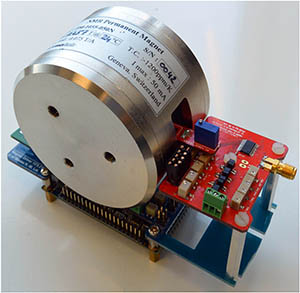The University of Macau (UM) has reached a next level in microelectronics research! Prof Elvis Mak Pui-In in the Department of Electrical and Computer Engineering at UM, who is also the associate director (research) of the State-Key Laboratory of Analog and Mixed-Signal VLSI and the Institute of Microelectronics, has been elected a fellow of the Royal Society of Chemistry (RSC) in the United Kingdom. Founded in 1841, RSC (www.rsc.org) is the oldest chemical society in the world, with more than 54,000 members. Achieving fellow status in the chemical profession denotes to the wider community a high level of accomplishment as a professional chemist.
Prof Mak’s multidisciplinary research group developed a series of digital microfluidic and nuclear magnetic resonance (NMR) technologies for advancing the analytical chemistry via the microelectronics. The inventions are internationally recognised with a number of patents, books, and articles, some of which have been published in RSC Lab on a Chip, RSC Analyst, RSC Advances, ACS Analytical Chemistry, Oxford Bioinformatics, Nature PG – Microsystems & Nanoengineering, Elsevier Sensors and Actuators, Springer Microfluidics and Nanofluidics, Nature PG – Scientific Reports and IET Micro & Nano Letters. In 2019, the team founded the DigiFluidic Biotech Ltd. (https://www.digifluidic.com/) , a spin-off company of UM that commercialises digital microfluidic chips for virus screening and food-quality monitoring.
Prof Mak is a native of Macao and an alumnus of UM. He was elected a fellow of the Institute of Electrical and Electronics Engineers (IEEE) in 2019 for his contributions to radio-frequency and analog circuits. He was elected a fellow of the UK Institution of Engineering and Technology (IET) in 2018 for his contributions to engineering research, education, and service. In the same year, he was named an Overseas Expert of the Chinese Academy of Sciences for his expertise in microelectronics. He received the Commemorative Medal for the 70th anniversary of the People’s Republic of China in 2019.
Microelectronics is one of the main research areas at UM. It has won the second prize of the State Scientific and Technological Progress Award and was ranked second in the world in terms of the number of papers published at the International Solid-State Circuits Conference, second only to Intel.
澳門大學微電子研究更上一層樓!澳門大學電機及電腦工程系教授、模擬與混合信號超大規模集成電路國家重點實驗室和微電子研究院研究副主任麥沛然當選為英國皇家化學學會(Royal Society of Chemistry, RSC)會士。RSC成立於1841年,是世界上最歷史悠久的化學學會,也是最有影響力的國際權威學術機構之一。是次獲選彰顯了麥沛然在相關領域的卓越成就和貢獻。
麥教授的多學科研究團隊開發了一系列數字微流控和核磁共振(NMR)技術,冀通過微電子技術促進分析化學的發展。相關發明獲得了多項專利,團隊也就相關研究成果發表了一系列書籍文章,其中一些被刊登在不同期刊中,包括《RSC芯片實驗室》(RSC Lab on a Chip)、《RSC分析師》(RSC Analyst)、《RSC進展》(RSC Advances)、《分析化學》(ACS Analytical Chemistry)、《牛津生物信息學》(Oxford Bioinformatics)、《自然PG-微系統和納米工程》(Nature PG-Microsystems&Nanoengineering)、愛思維爾傳感器與執行器》(Elsevier Sensors and Actuators)、《Springer微流體和納米流體》(Springer Microfluidics and Nanofluidics)和《自然PG-科學報告和IET微納米信》(Nature PG – Scientific Reports and IET Micro & Nano Letters)。2019年,該團隊成立了澳大的衍生公司——迪奇孚瑞生物科技公司(https://www.digifluidic.com/),致力於病毒篩查和食品質量監測的數字微流控芯片商業化。
麥沛然是土生土長澳門人,也是澳大校友。由於在射頻和模擬電路領域的傑出貢獻,他於2019年當選為國際電機電子工程師學會(IEEE)會士。由於在工程研究、教育和服務領域的貢獻,他於2018年當選為英國工程技術學會(IET)會士。同年,由於在微電子領域的專業知識,他被任命為中國科學院海外專家。2019年,麥沛然獲得中華人民共和國成立70週年紀念獎章。
澳大微電子研究是澳大的主要方向之一,獲國家科技進步獎二等獎,在國際固態電路會議發表論文數量名列全球第二,僅次於英特爾(Intel)。

Prof Elvis Mak Pui-In
麥沛然

Portable NMR relaxometry instrument
便擕式核磁共振弛豫儀

